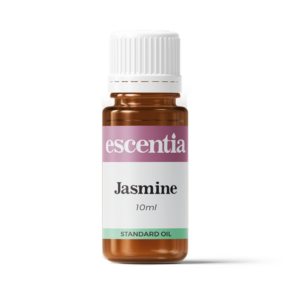Jasmine standard oil can be used for:
Traditionally, jasmine oil has been used in places like China to help
the body detox and relieve respiratory and liver disorders. It’s also
used to decrease pain associated with pregnancy and childbirth.
Jasmine essential oil has been described as having a warm, exotic,
floral fragrance that relaxes, soothes, uplifts, and enhances
self-confidence. Research has suggested that jasmine oil works by
positively influencing the nervous system. Through aromatherapy or by
penetrating the skin, the oils from the jasmine flower have an effect on
a number of biological factors — including heart rate, body
temperature, stress response, alertness, blood pressure and breathing.
Many people refer to jasmine oil as a natural aphrodisiac because
it’s said to have a “seductive” scent that can increase sensuality. In
fact, jasmine oil is sometimes nicknamed “queen of the night” — both
because of the strong smell of jasmine flowers at night and also because
of its libido-boosting qualities. One could make a natural perfume
blend by adding a drop along with your favourite carrier oil and one
drop of either Frankincense Carteri, Mandarin, or other essential oil.
Jasmine has been used throughout the centuries to:
- Assist with depression and anxiety – Many studies
have found improvements in mood and sleep after using jasmine oil either
as an aromatherapy treatment or topically on the skin, as well as it
being a way to boost energy levels. Results demonstrate that jasmine oil
has a stimulating/activating effect of the brain and also helps improve
mood at the same time.
- Improve Immunity and Fight Infections – Jasmine
oil is believed to have antiviral, antibiotic and antifungal properties
that make it effective for boosting immunity and fighting illness. In
fact, jasmine oil has been used as a folk medicine treatment for
fighting hepatitis, various internal infections, plus respiratory and
skin disorders for hundreds of years in Thailand, China and other Asian
countries.
- Increase arousal in bodily functions – Compared
with a placebo, jasmine oil caused significant increases of physical
signs of arousal — such as breathing rate, body temperature, blood
oxygen saturation, and systolic and diastolic blood pressure.
- Assists with insomnia – Jasmine oil exhibits a
calming effect that can act as a natural sedative and help you sleep
better. Inhaling jasmine along with lavender may help to reduce heart
rate and bring on feelings of calm and relaxation, which are all
important for dozing off and avoiding restless nights.
- May prevent or improve PMS symptoms – Studies show
that jasmine oil is among a group of essential oils that help balance
hormone levels by acting as phytoestrogens, plant constituents with a
phenolic structure similar to estrogen. This gives therapeutic-grade
oils, including jasmine oil, the ability to help correct PMS, menopause
and other hormone-related issues.
- May assist in decreasing the symptoms of menopause –
Using jasmine oil either as an aromatherapy treatment or applying it
directly to the skin can help decrease emotional and physical symptoms
of menopause and work as a natural remedy for menopause relief.
- May assist with post-pregnancy symptoms – Jasmine
is known to help ease postpartum symptoms, including anxiety,
depression, muscle pain and low energy, which isn’t surprising based on
jasmine research. It has also been used traditionally to increase
production of breast milk. Additionally, applying jasmine oil to the
skin may help decrease signs of stretch marks and prevent scarring.
- Promotes Healthy Skin – Jasmine has been used in
many skin facial creams for revitalization, dry skin, anti-aging,
reducing inflammation, oily skin conditions and psoriasis. Try mixing
jasmine oil into your face cream, shower gel or body lotion to reduce
blemishes, improve dryness, balance oily skin, prevent wrinkles and fine
lines, and calm shaving irritation.
Blends well with: Vetiver, sandalwood, patchouli, bergamot, geranium, neroli, sweet-orange, rose and ylang ylang.
